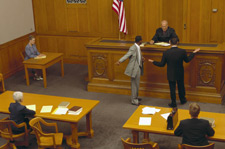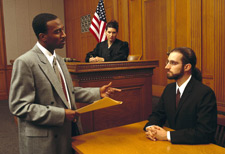Home | Glossary | Resources | Help | Contact Us | Course Map
Archival Notice
This is an archive page that is no longer being updated. It may contain outdated information and links may no longer function as originally intended.
Expert Witness Qualification
In more sequential terms, what transpires is that the examiner is called to the stand. The attorney who called this individual then proceeds with a line of questions designed to establish the qualifications (education, training, knowledge, skill, etc.) that are sufficient for the court to accept them as an expert in their particular field. The attorney, at the conclusion of his qualifying questions then proffers the witness as an expert in the field. Prior to the court ruling, the judge will inquire whether the opposing counsel wishes to make an inquiry of the witness, which is known as voir dire . This provides the opposing counsel an opportunity to challenge the qualifications and preclude the examiner from being accepted by the court as an expert.
If the court does not recognize the examiner as an expert in the particular field, then the examiner will not be permitted to give any opinion testimony. On the other hand, where an examiner is recognized by the court as an expert in a particular field, the examiner will be permitted to give opinion testimony evidence.
Attorneys (both prosecution and defense) may attempt a tactic where, after being recognized as an expert in a particular field, they attempt to elicit opinion testimony outside the range of their particular expertise. All attempts to solicit an opinion outside the scope of an examiners expertise should be responded to with I am unable to render an opinion in that field as I am not qualified as an expert in that particular area.
Witnesses must ensure that their curriculum vitae (CV) is accurate, complete, and free of any errors or omissions. Examiners should not underestimate opposing counsel checking into the background and representations of the witness on the CV.
Opinion Testimony
Generally, unless an express exception exists, opinion testimony is not admissible in court. Expert witnesses may, if qualified and recognized by the court, give their opinion. The proponent of the evidence must establish the qualifications of the expert witness from whom they will seek opinion evidence in court.
Giving Testimony
This procedural process excludes witnesses from hearing each others testimony and from discussing their testimony with anyone else. Failures to adhere to this process have ranged from dismissal of the charges to reprimands and exclusion of the evidence.
The Process of Giving Testimony
It is helpful to understand the process by which testimony is presented. The attorney who has called the witness is said to be the proponent of the evidence. The burden is upon this proponent to establish certain criteria before the witness is recognized as an expert and able to render an opinion in court. After being accepted and recognized as an expert with the particular discipline, the proponent proceeds with his or her questions first under what is known as direct examination. Direct examination is governed by certain rules that prohibit leading questions from being asked. Leading questions are usually more narrative in construction and suggest the desired response. The more frequent objections that are made during direct examination are leading and nonresponsive or narrative. These generally have little impact on the substance of the information. Witnesses should not permit themselves to become distracted or agitated at these interruptions.
Following direct examination, the opposing counsel is afforded an opportunity to cross-examine the witness. Although these questions are permitted to be leading, they are limited to the scope (or confines) of the subjects covered under direct examination. The judge may grant wide latitude of the actual scope during cross-examination with the hopes of shortening the experts time on the witness stand.
Upon completion of the cross-examination, the proponent attorney may or may not ask further questions during redirect examination. The line of questions during this phase should be within the confines of the cross-examination and not go into any new areas. The primary purpose of this phase is to permit the proponent to rehabilitate or clarify responses given during cross-examination.
Finally, the opposing counsel may or may not be permitted to have a line of recross-examination questions. Theoretically, the field of the questions should be continually narrowing with each succession. In real life, the field and number of redirects and recrosses will ultimately be determined by the judge.
Objections
Law and Order and other courtroom dramas on television have created the stereotyped image of the lawyer who stands up and yells, Objection Your Honor! The court then sustains or overrules the objection and testimony resumes. If the court sustains the objection, the witness must not answer the question that was posed. In contrast, the overruled objection allows an answer to be given. Although it may not seem to be the case, there are rules and limits that govern objections.
Additional Online Courses
- What Every First Responding Officer Should Know About DNA Evidence
- Collecting DNA Evidence at Property Crime Scenes
- DNA – A Prosecutor’s Practice Notebook
- Crime Scene and DNA Basics
- Laboratory Safety Programs
- DNA Amplification
- Population Genetics and Statistics
- Non-STR DNA Markers: SNPs, Y-STRs, LCN and mtDNA
- Firearms Examiner Training
- Forensic DNA Education for Law Enforcement Decisionmakers
- What Every Investigator and Evidence Technician Should Know About DNA Evidence
- Principles of Forensic DNA for Officers of the Court
- Law 101: Legal Guide for the Forensic Expert
- Laboratory Orientation and Testing of Body Fluids and Tissues
- DNA Extraction and Quantitation
- STR Data Analysis and Interpretation
- Communication Skills, Report Writing, and Courtroom Testimony
- Español for Law Enforcement
- Amplified DNA Product Separation for Forensic Analysts



